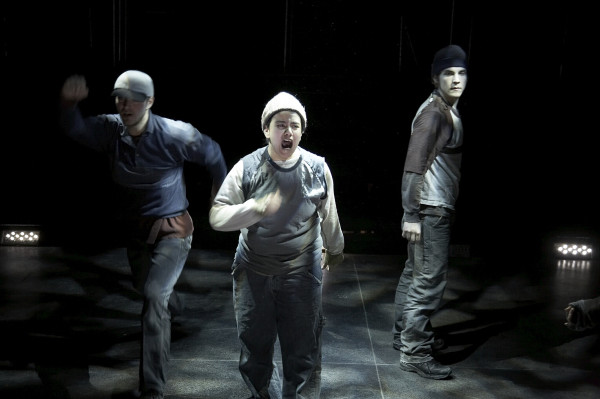The struggles of undocumented immigrants take center stage in a revival of a play based in Chicago’s Northwest Side. The Albany Park Theater Project tells the story of day laborers, and a teen struggling without a Social Security number. Chicago Public Radio’s Lynette Kalsnes has this report.
The first act, called “Amor de Lejos,” or Love from Afar, opens with a man named Mateo sleeping on the floor. Then his wife appears, and teasingly wakes him up.
LYRICS: The first time I saw her, I knew she would be mine.
They dance with great intimacy, separating briefly, but always coming back together. That’s about to end.
MATEO: Mexico is hell to cross.
Mateo is now a day laborer in Chicago.
The workers dig ditches, and demolish homes in stylized, sweeping motions that show the heaviness of their labor. They tell stories about getting hurt on the job, working without insurance, and being called names.
MATEO: I’ve been here 13 years, and I still haven’t achieved everything I wanted, and so I’m not close to the day I can return home. I’m asking God to open the doors of opportunity, because I need my wife. When love is so far apart for so long, the love gets lost.
The first act ends with husband and wife back on stage, dancing apart, reaching for one another. But they keep missing, and their arms remain empty.
The performance is one of two short works that make up Aqui Estoy, or Here I Am. The ensemble of teens and young adults creates and performs works based on the stories of people in the neighborhood.
Co-founder David Feiner says, in its 10-year history, more than 70 percent of the cast members have been children of immigrants.
FEINER: As we debate policy, it’s always important to remember that we’re talking about real people, and we’re making decisions that affect people’s lives. And I think one of the things that theater can best do is it can increase our empathy.
The character of Mateo is played by Sam Ortiz, a first-generation American.
ORTIZ: It matters to me because a lot of my friends are immigrants. These are people who want to study and they want to better themselves. It’s a shame they don’t have these opportunities.
Ortiz says playing a day laborer gave him a new understanding of what undocumented immigrants go through.
ORTIZ: He missed his children growing up. He missed his son shaving in the mirror, a lot of the things that people take for granted. What if his wife doesn’t love him anymore? It’s not fair.
A fellow cast member gained a similar perspective.
Elizabeth Cobacho helped gather the oral histories that became the first act.
COBACHO: No one wants to cross the desert, and be attacked by the Minutemen. No one wants to come here, leave their families behind to clean our pools, or to mow our lawns, or to clean our toilets.
If anything, she says, they want opportunities in their own countries.
In the second act, Mourtaza Ahmad Ali plays a young undocumented immigrant named Julio.
Julio comes up against J. Wilbur Worker, a frightening and mythical creature in a cream suit, who represents all the doors that are closed to him without a Social Security card.
WORKER: Want to go away to school?
JULIO: I do.
WORKER: Want a good job?
JULIO: I do.
WORKER: Want to see the world?
JULIO: I do.
WORKER: Want to buy a house someday? I do.
JULIO: Want to marry for love someday? I do.
As the play progresses, Julio’s mother and Wilbur Worker place sections of chain-link fence at the edges of the stage. By the end, Julio is literally caged in.
JULIO: I feel like an American. I’m certainly not Colombian. I am an American. I am an American. I am an American.
This is the second time the company has staged Aqui Estoy.
David Feiner says the troupe brought the production back out of frustration and even a little desperation.
FEINER: So little has changed in regard to immigration policy in our country, and in regards to the way that undocumented immigrants live.
After each performance, the company discusses immigration with its audience and passes a petition in favor of immigration reform. Albany Park Theater Project plans to send a DVD of Aqui Estoy to every member of the U.S. Senate.
I’m Lynette Kalsnes, Chicago Public Radio.
 Menu
Menu
